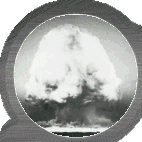| |
The Decision to use the Atomic Bomb - Cons
Now that America had successfully created an atomic bomb President Truman, and the scientists involved
had to decide whether the atomic bomb should be used against the Empire of Japan, since the rest
of the axis forces had already surrendered. There were many arguments for both sides and many of
the reasons are still debated today. Many of the scientists did not want the bomb used. In the document called "Protection of Civilian Populations
Against Bombing From the Air in Case of War" the assembly unanimously voted for some of the following
laws:
"The intentional bombing of civilian populations is illegal...Objectives aimed at from the air
must be legitimate military objectives and must be identifiable...Any attack on legitimate military
objectives must be carried out in such a way that civilian populations in the neighbourhood are not
bombed through negligence". Many people argued that since the bomb was powerful enough to
eliminate an entire city it should not be used. Most of the cities
that were proposed targets had more that 30,000 civilians and death count would be huge. The radiation would probably kill and injure those not killed by the heat
and smoke. A few were also thinking towords the future,
they were wondering what would happen if another country discovered the bomb and there was an atomic war.
Some other people were thinking of a less severe view, and they wanted the bomb used, but not dropped on Japan,
they felt a demonstration was needed. Some scientists wrote a Franck Report and here is an excerpt: "From this point of view a demonstration of the new weapon may
best be made before the eyes of representatives of all United Nations, on the desert or a
barren island...The development of nuclear power not only constitutes an important addition to the technological and military power of the United States, but also creates grave political and economic problems for the future of this country.
Nuclear bombs cannot possibly remain a "secret weapon" at the exclusive disposal of this country, for more than a few years. The scientific facts on which their construction is based are well known to scientists of other countries. Unless an effective international control of nuclear explosives is instituted, a race of nuclear armaments is certain to ensue following the first revelation of our possession of nuclear weapons to the world. Within ten years other countries may have nuclear bombs, each of which, weighing less than a ton, could destroy an urban area of more than five square miles. In the war to which such an armaments race is likely to lead, the United States, with its agglomeration of population and industry in comparatively few metropolitan districts, will be at a disadvantage compared to the nations whose population and industry are scattered over large areas.
We believe that these considerations make the use of nuclear bombs for an early, unannounced attack against Japan inadvisable. If the United States would be the first to release this new means of indiscriminate destruction upon mankind, she would sacrifice public support throughout the world, precipitate the race of armaments, and prejudice the possibility of reaching an international agreement on the future control of such weapons.
"
On July 3, 1945 Szilard signed a petition, along with 38 others, pressing the President not
to use the bomb. Here is an excerpt from Szilard's Pention: "Atomic bombs are primarily a
means for the ruthless annihilation of cities. Once they were introduced as an instrument of
war it would be difficult to resist for long the temptation of putting them to such use".
There was many reasons against using the bomb but there was many reasons for it.



|
|



